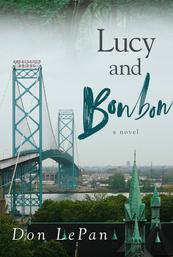Lucy and Bonbon
Comments, and a Brief Description
“Never before have I read a book that is at once so riveting and so profoundly morally poignant. [Lucy and Bonbon] cuts deeply into the arrogance of human exceptionalism, and presses us to confront our lingering superiority complex.”
Jonathan Balcombe, author of Second Nature: The Inner Lives of Animals and of What a Fish Knows: The Inner Lives of Our Underwater Cousins
“Lucy and Bonbon is a remarkable achievement. Don LePan raises extremely important ethical and philosophical issues, and weaves them into an intriguing story with a page-turning finish.”
Peter Singer, Princeton University / University of Melbourne, author of Animal Liberation, Practical Ethics, and The Most Good You Can Do
“… a fascinating exploration of ideas. The prose is a joy to read and the two main characters are unforgettable. In Bonbon, the ‘hybrid,’ LePan has created a voice that is intelligent, self-aware, empathetic and observant, and the fact that he views humanity from both the inside and outside offers an amazing perspective. Lucy and Bonbon is compulsively readable as it builds to its extraordinary and thought-provoking conclusion.”
Deborah Willis, author of The Dark and Other Love Stories and Vanishing
“I greatly enjoyed Lucy and Bonbon. At first something of a novel of ideas, it turns into an exciting escape drama, with a sting in the tail, a surprise look into the unknown future. It leaves the reader wanting a sequel!”
Richard Dawkins, University of Oxford, author of The Selfish Gene, The Blind Watchmaker, and The God Delusion
“Lucy and Bonbon provocatively pushes against legal definitions of personhood, the notion of scientific objectivity, and the concept of freedom in its exploration of the permeability of the species divide. … LePan’s novel challenges us to occupy the liminal space of the border between human and non-human animal, between new elected President Trump’s United States and Canada, between reason and emotion, and, most importantly, between what is and what might be possible.”
Laura Wright, Western Carolina University, author of Wilderness into Civilized Shapes: Reading the Postcolonial Environment
“Lucy and Bonbon unfolds in intriguing stages, each one with characteristics true to the genre.… A trio of storytelling techniques energizes LePan’s unique tale. Variously breakneck, inquisitive, and literarily playful, Lucy and Bonbon showcases an author who’s as assured with Big Questions as with the nuts and bolts of complex narration.”
The British Columbia Review
“LePan builds to a suspenseful conclusion, keeping the reader guessing until the end. All in all, an interesting, entertaining, and emotionally impactful read.”
The Miramichi Reader
Description ______________________________________________________
What if humans were able to reproduce with other great apes? What would the hybrid offspring look like? Act like? Think like? And how would humans respond? Are we ready to accept a human-ape hybrid in our midst? Or would such creatures be put under a microscope in a zoo or research facility?
Lucinda Gerson is an outspoken, free-spirited working-class single mother. She has grown up in Comber, just outside Windsor, and her life hasn’t taken her much further than Detroit—that is, not until her more highly educated sister travels to the Congo to work at a great ape research station. After an uncle leaves her some money in his will, Lucy decides to travel the world as well. Lively and unpredictable, she’s the sort of person you might call “one of a kind.”
Her child Bonbon is quite literally one of a kind.
Lucy and Bonbon tells the story of mother and child, and of the controversy that swirls around them over the course of the child’s first fourteen years. As the story unfolds and young Bonbon begins to yearn for freedom, we are forced to interrogate our society and ourselves: what does it mean to be human? Moving back and forth across the border between Windsor and Detroit, to Toronto, and then west, the novel takes us on an extraordinary (and, as it builds to a taut climax, extraordinarily suspenseful) journey in search of answers. Lucy and Bonbon is a story of freedom and captivity, of love and friendship, of borders and of border crossings, and of what we owe to one another.
about the author:
Don LePan has spent most of his adult life working as a book publisher; he is the founder and CEO of the academic publishing house Broadview Press. He has also worked as a taxi driver, a hospital cleaner, and a secondary school teacher. He holds a BA from Carleton University, an MA from Sussex University, and was awarded an honorary doctorate by Trent University in 2004 for his contributions to academic publishing. Lucy and Bonbon is his third work of fiction. LePan’s non-fiction books include a study of Shakespeare’s plots and of cognitive history, an overview of common errors in English, a glossary of literary terms, and a book on the ethics of English usage.
LePan is also a painter (a solo exhibition of his work was held in Brooklyn in 2008), and has long been active politically, first within the NDP and more recently in the Green Party of Canada. Born in Washington, DC and raised in Ontario, he spent many years as a resident of Calgary, and has lived for briefer periods in New Orleans, Louisiana; Lewes, Sussex; and Murewa, Zimbabwe. Since 2009 his home has been Nanaimo, British Columbia.
